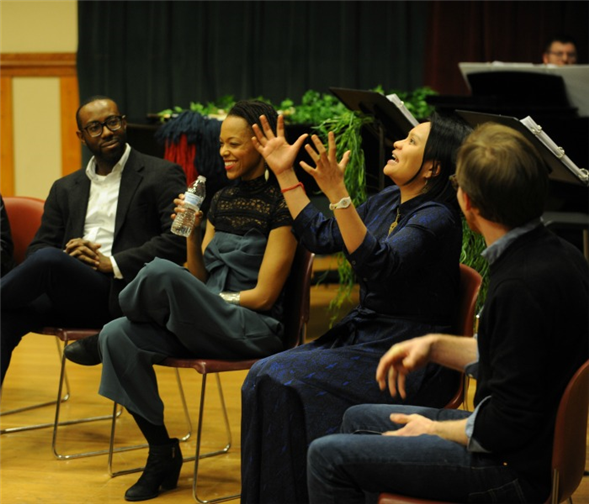Translate Page

A dramaturg shares his ideas for making this post-show staple more engaging for audiences and artists
---
I'm a dramaturg. That term means different things depending upon whom you ask. But in my case, it often means I'm the lucky theatre staffer tasked with moderating the post-show Q&A between the artists and the audience, commonly known as the talkback. And, I must confess, most of the time, I loathe it. Whenever you give the audience a microphone, it's inevitable that someone will (usually unwittingly) upset the theatre-makers. I've seen actors quake with frustration trying to come up with intelligent answers to inane questions like, "How did you learn all those lines?" I've become an expert at reining in soliloquies that start with "a comment -- well, more of an observation, actually." But the truth is, grating as some of the feedback is, bad talkbacks are never the audience's fault.
It's on us, the mediators, and the institutions we represent. We'll plan a production for years. But for a talkback, we can hardly afford 30 minutes! We'll dig up the same limp questions -- "What stuck out to you?" -- and won't ask what we really want to know: "Why did you buy a ticket to our show?" As TDF's recent Triple Play research project proved, audiences have very strong opinions about why they see (or skip) new plays. We administrators talk a big game about theatre as a public service. Yet when the time comes to hear from the public directly, most of us can't bear to listen.
And I get it. For moderators, talkbacks are treacherous business. It takes remarkable skill to gracefully guide a roomful of strangers toward some semblance of a meaningful conversation. Sometimes it's damn near impossible. But I'm done sounding like playwright David Mamet, who despises talkbacks so much he prohibits them after his shows. I'm calling on all audiences, artists and administrators everywhere: reclaim the talkback with me!
Let's make our talkbacks exhilarating. By honestly sharing and examining our different points of view, we exercise our right to regard one another as equals. In an acclaimed TED Talk, Oskar Eustis, visionary artistic director of The Public Theater, argued that theatre is a catalyst for civic discourse. "The idea that truth comes from a collision of different ideas, and the emotional muscle of empathy, are the necessary tools for democratic citizenship." What if, instead of treating the talkback as a chore, we embraced it as an opportunity to put democratic thought into action? What might happen if theatre institutions started to view the talkback as essential to the experience of a play?
Some theatres are already leading the way by piloting innovative pre- and post-show programming, like Milwaukee Repertory Theater, which broke audiences into small groups of participants to share personal stories that related to the play's themes. Or Chicago's Goodman Theatre, which invited patrons to a tech rehearsal and then led a discussion about the show. Just this week, the artistic directors at four lauded nonprofits talked to American Theatre about the various ways they engage audiences beyond the stage.
So let's not just talk about the artists -- let's focus on the ideas in the art. Let's clarify expectations around what kinds of comments are and aren't productive to building inclusive space. What else? If there were no rules, what would you do to make talkbacks awesome?
For me? I might start by comping theatregoers a post-show glass of wine. Tipsy audiences may be problematic during the play, but after the curtain falls it promises to spur some much-needed talkback truth.
---
Ned Moore is a dramaturg and theatre writer who's helping launch a new talkback program at the Pittsburgh Public Theater. Follow him at @nedmooretheatre. Follow TDF at @TDFNYC.
Top image: The author (far right) leading a talkback at the Pittsburgh Civic Light Opera. Photo courtesy of Matt Polk and Pittsburgh CLO.
TDF MEMBERS: Browse our discount tickets for theatre, dance and concerts.